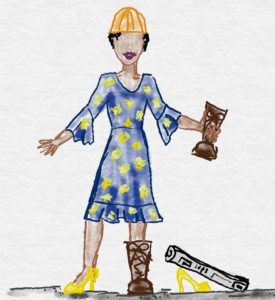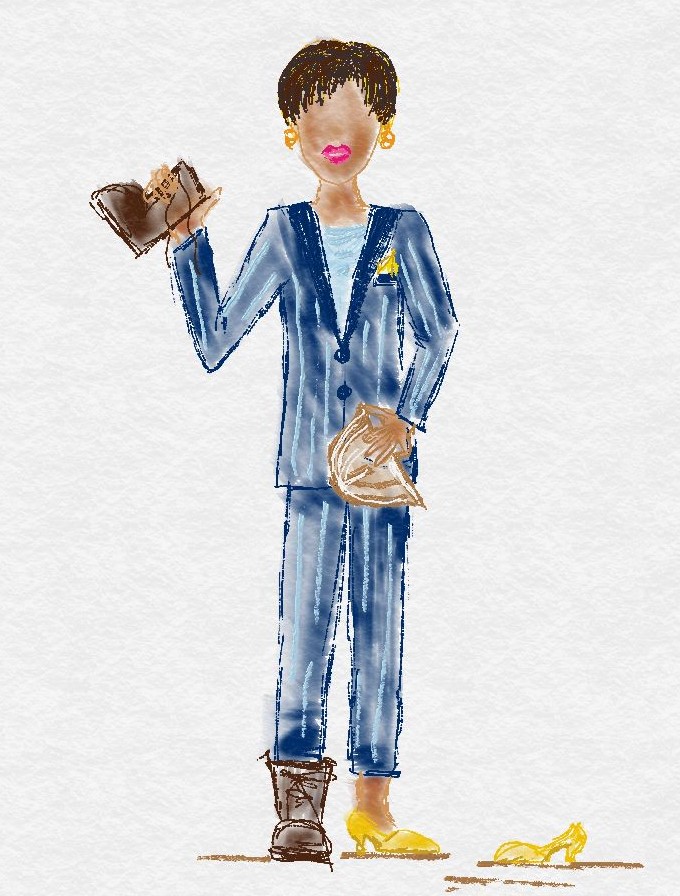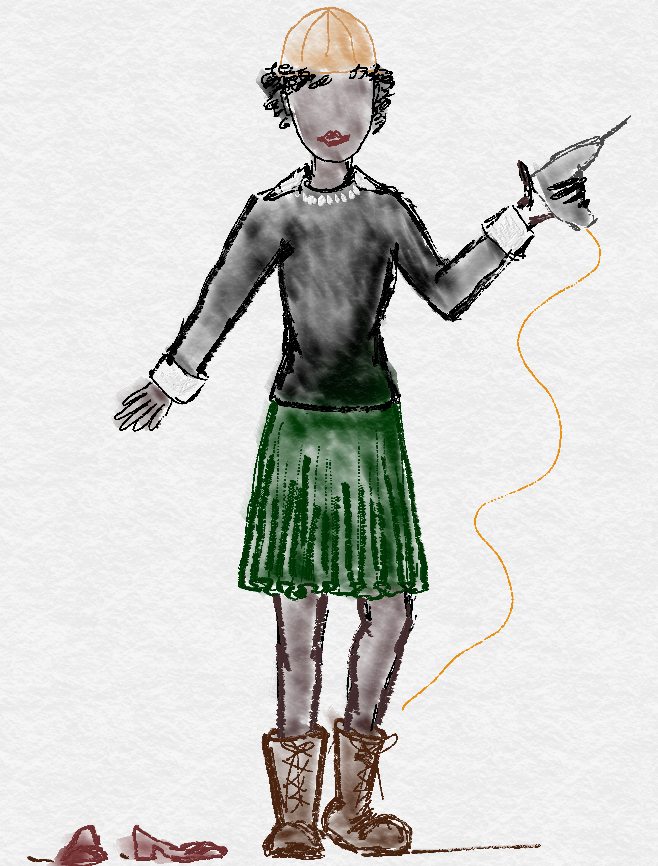Uncategorized
Being Small
Taking Charge of Your Presence

During the writing of this post, in which we decried The Spread, I happened to be talking to a member of the Underpinnings community. When I mentioned the subject of the post, she said, “I would never say anything if a guy did this. I always just try to make myself small in most situations.” A few weeks later, I heard an interview with a movie director who talked about making herself small in a relationship. In other words, she had tried to shape her existence to be most convenient for her partner. She had recently made the realization that she was purposefully minimizing any of her needs in order not to seem needy or a bother, so that her partner would find it more appealing to be with her. Making herself small also involved playing down her accomplishments so that he wouldn’t feel lesser.
I wish I could say I had no idea what either of these women meant by making yourself small. I wish I could say I’ve never acted like I wasn’t uncomfortable/upset so that a partner wouldn’t look at me in a negative light, and that I’ve never played down a big success at work so that a guy wouldn’t feel overshadowed. I wish I could say I’ve never gone into a meeting and taken a seat in a back corner so as not to attract attention. But I would be lying if I did.
With exceptions, women often have a natural instinct to take care of others. Our roles as caregivers are hard to turn off, and we don’t stop watching out for those around us when we finish wiping noses and changing diapers. (Yes, that includes wiping figurative noses at work). As such, we don’t think about what we do to ensure the comfort of others. That guy on the plane is more comfortable when he Spreads, and part of us wants him to be comfortable. So often we sacrifice our own comfort and needs in our actual caregiving roles, and this tendency bleeds over into our interactions with others for whom we are not responsible. It’s just an instinct.
But beyond our nurturing inclinations, many of us also don’t know how to take up for ourselves, either subtly or aggressively. We have been told for so many years that nice girls don’t demand things for themselves. Nice girls go along with the situation and adapt and accommodate. Oh, isn’t she a saint? We’re told that it’s aspirational to be a martyr. News flash – martyrs are annoying and hard to be around.
Another member of our Underpinnings community also mentioned to me that she had changed jobs because she didn’t feel like she was appreciated and she didn’t think anyone at her company cared about her future there. Another company made her an offer, and the attention and interest were impossible to resist. Someone was paying attention to her career needs! After she left, she realized that she never actually sat anyone at her old company down and said, “I really like it here but we need to discuss my path forward. I want to know how we’re going to make me an integral part of the management team.” She thought they would be looking out for her needs, and she worried how it would look if she took aggressive control over her own career. She moved on to greener pastures, and unfortunately found Astroturf.
Yes, it’s a vital part of being a human to be considerate of others. We all should look around and think about what our friends and family and co-workers need and want. But we should not do this to the exclusion of our own needs and wants. It’s certainly critical to any relationship to be a good, supportive partner. But no healthy relationship is one-sided. Ignore the “I-just-do-everything-for-my-family” crap. You’re setting a bad example for your kids, particularly your daughters, if you give up everything for everyone else. Do you want them doing that in 15 years? It may make good Instagram copy (“Just spent 8 hours getting these huge blisters hand-digging and building my kids their own wading pool/splash pad. #supermom #mypainisworthit”), but it’s an unbalanced, unhealthy approach to life that will leave you feeling frustrated and resentful.
If you are not giving voice to your feelings because you are afraid your partner will view you less favorably, you are not giving the relationship the chance to be as strong as it could. If your partner really would think of less of you for expressing your needs and emotions, you don’t need that person. Even worse, if your partner is someone who needs you to build him/her up by minimizing who you are…….you REALLY need to get a new partner. No, no – don’t make excuses. Anything you could say I’ve said myself before, and it was wrong.
We need to stop expecting others to respect us and appreciate us and help us only when they intuit that we need something. We need to be more direct in voicing our needs in a fair and balanced way. This doesn’t mean demanding attention or screaming at the guy next to you who is encroaching on your airline space. There is a happy medium between suffering in silence and launching into a tirade. And we need to feel comfortable walking into a meeting or working on a jobsite without feeling like we need to be small so that no one uses words like “pushy” and “bitchy” behind our backs.
In our careers it is vital that we make ourselves the opposite of small. Those above you should know that you are staunchly committed to an upward career path (as long as that’s the case). Stating your goal is not “pushy” and “unattractive,” despite what you might have read in a magazine at some point. Trust me, whoever runs your company wants people on board who want to succeed. And they aren’t sitting around trying to figure out what you want and need – they don’t have time. So tell them. And give them a chance to help you realize your goals. Success in business takes time and communication, not mind-reading and fence-jumping. Bosses are like spouses – they rarely know what you’re thinking unless you tell them.
If you want something in your life to change, whether that be your space on an airplane or your inclusion in Monday management meetings or HOW OFTEN YOU HAVE TO CLEAN UP SHOES FROM THE FOYER, you have to change it. If that change depends on the actions of others, you have to actually tell them you want something to change. Don’t make yourself small; make yourself effective.
Field Dressing
De-Coding Dress Code

I was having a conversation the other day with another woman in the geotechnical field. I mentioned a dynamic woman whom I admire in our industry, and the other woman looked apprehensive and said, “Yes, she’s good, but she wears such tight clothes to meetings.” To her credit, before I could become outraged, she said, “I know – that’s her decision, and it doesn’t change how talented she is.”
Obviously the line between inappropriate work clothing (short shorts and a tube top) and risky work clothing (a tight leather skirt and a sheer blouse) can be murky and worse, a moving target. Sometimes it is difficult to know whether you’re expressing yourself or committing career suicide. Often the older you get, the less you care, but the questions persist. We all want to meet a professional dress code, but…what is it?
We women have a very complicated relationship with clothing. On one hand, some of us love it. (Yes, I’m raising my hand here). We shop and read magazines and study the outfits of everyone around us. For us, our attire is part of our self-expression and even a necessary creative outlet.
On the other hand, some women don’t care. Clothing is a necessary utility, but they couldn’t tell you the state of hemlines this year or whether cargo pants are back. (If you just said, “They were gone?” then you’re part of this latter group).
Neither opinion is right or wrong. The same could be said for many similar items that we use every day, like phones and cars. My stepdaughter knows what changes have been made to the bumpers and roof lines of most auto models every year; I have a hard time finding my own car in Kroger’s parking lot on a weekly basis.
What differentiates clothing from these other necessities is the fact that what we wear has a direct effect on how others see us. From first impressions to professional situations, clothing is integral to our public persona. Even women who don’t care about fashion have to put some effort into what they wear, lest their lack of attention to their attire be mistaken for a lack of care about themselves. Show up sloppy and you’re telling the world that you don’t respect yourself.
This situation is complicated by the fact that even those of us who do like clothes aren’t always happy with how we look in them. Body image, internal perceptions, long-held erroneous images of ourselves – all of these things add hundreds of layers that color our opinions when we stand in front of a dressing room mirror and in front of our own mirrors every morning.
And if our internal baggage weren’t enough, we have historic social tensions that affect how we see other women. Until recent history, women couldn’t own property in most parts of the world, so they were dependent on relationships with men to survive. Women also weren’t valued for their minds, so men typically chose women based on their looks. Even if “clever” women resented their lack of prospects compared to pretty women, there was little to nothing they could do about it. Unfortunately, even though women now are valued more often for their minds and don’t starve just because they’re not married, we still retain that base competitive nature. “Yeah, she just got by on her looks.” “Of course she got the job – look at those legs in that skirt.” Tragically, we unconsciously reinforce those historic cultural views, that women are either pretty or smart. And we regard the blatantly “pretty” with catty envy disguised as lofty intellectualism. Magazines, movies, and 50-ft billboards don’t help by constantly telling us that we are not pretty or thin or tan or fill-in-the-blank enough. The world insists on sending us a constant stream of mixed messages, and few of those messages say that we look fabulous today AND we’re smart as hell.
Yes, you could say that women who obviously use their sexuality to get attention or get ahead are…what? Using an unfair advantage? You know that those looks will only go so far if the woman is question just landed a geo-structural position designing complicated retention systems. What if she’s actually smart, too, but she feels comfortable putting her sexuality more front and center than you do? As we’ve said before in this space, she’ll have to deal with the consequences. Those consequences frankly are often exhaustingly complicated and make me tired just to think about them, but if that’s the road she wants to travel, I fully support her choice.
I believe we should be celebrating each other and helping the women around us realize what fabulous attributes each one of us has. It’s hard enough to deal with the Hamlet-esque soliloquy in your own head when you get dressed and look in the mirror in the morning, much less if you feel like others around you are piling on. The aforementioned woman with the tight outfits at meetings? I am in awe of her and would sell a kidney to look like her. I think she should wear what she wants, because someday she’ll be looking at wrinkles in the mirror and thinking, “Wow, I wish I had worn that short leather skirt before my legs looked like a sharpei.” (Yes, anyone who wants to show her legs should do so and be proud, but those of you in the over-50 category will understand what I mean).
All of us deal with everyday fashion issues, like packing for a 5-day work trip using only a carry on suitcase. Or what about that arctic conference room where you go for a monthly meeting and need to look professional but not in the Inuit style? Are there fashionable heels that can be worn safely when running between meetings at opposite ends of the Philadelphia Convention Center?
In the spirit of our ongoing quest to create a supportive community here at Underpinnings, we are introducing a new feature. Yes – a new feature! One of our members has extensive fashion knowledge and exquisite taste (in addition to being a brilliant contractor). She has agreed to come on board as part of our team to help answer your fashion questions. The name of her feature, “LA’s Closet,” is a nod to her West Coast vibe and the title of a new page on the Underpinnings site. She will remain anonymous so she doesn’t get mobbed on jobsites by people desperate for wardrobe advice. We encourage you to send in your questions, and she will provide answers and suggestions. Some examples might be:
“I have a dress that I love that I feel like might be a little too short for work events. Is there something I can add to it to make it work appropriate so I can get more use out of one of my most confidence-building pieces?
“I never know what works on my body type, so I just wear clothes that are baggy. Any suggestions on how I can figure out what works for me?”
“Can you help me come up with a capsule collection that I can use to minimize luggage on work trips?”
You get the idea. As my dad would say, there are no stupid questions, and if you’re thinking it, six other people probably are, too.
E-mail your questions to underpinningsgeo@gmail.com.
We look forward to hearing your questions and comments. Our regular posts will continue to appear, as well. The Underpinnings team is trying to give you as much useful content as possible.
No, That Doesn’t Make Sense
Just Stop

We are all in agreement that we, as women, need to stop apologizing, right? We covered the subject here, and we aren’t the only ones who believe that women undermine ourselves when we constantly apologize as a conversational tool.
Now that we have that out of the way….Okay, we probably don’t. It doesn’t take one article and an afternoon to change a lifetime of behavioral habits. We have to concentrate on our interactions and slowly cut the self-sabotaging behavior out of our daily lives. Maybe we should have accountability partners? One-step programs? (Step One: Don’t apologize when you’re not at fault). In any case, we recognize that this process will take a while, but the results will be empowerment, promotions, higher salaries, fame, and perhaps induction into the engineering/construction/marketing/Girl Scout cookie sales Hall of Fame. Aim high.
So, while we’re on the subject of behavioral changes, we might as well address another very current issue that has infiltrated our ranks. When was the last time you said, “Does that make sense?” Probably you had just laid out a new program for your company. Or maybe you were explaining to a client why his wall just fell over. Perhaps you were politely outlining to some mid-level cookie manager why helping your daughter sell Girl Scout cookies is important but cannot be the priority in your day. The possibilities are endless.
Yes, you just realized that you’ve used this phrase six times in the past four hours. But wait, you say, isn’t that just being polite? Am I not just acknowledging the other person’s need to understand and giving him/her the option of admitting that the subject isn’t completely clear yet? Isn’t this sensitive and inclusive and all those other things we accuse men of not being in the workplace?
The lesser answer is yes. Absolutely, you are a more effective communicator if you give another person the opportunity to ask for clarification. You are exchanging ideas, not lecturing. You are being a good consultant/contractor/cookie manager. Obviously you are not doing your job well if the other person doesn’t understand what you are trying to say. This is why I once seriously disciplined a junior engineer when he said, “Hey – we’re not English majors,” after I told him his report was unclear and poorly written. (Yes, there was also the issue of being disrespectful to his boss).
The more far-reaching answer is no. True, acknowledging the listener’s ability to understand is critical. But the wording is flawed. “Does that make sense?” subtly implies that the delivery was insufficient or inadequate. Even worse, it suggests that maybe the reasoning is incorrect. Once again, we put the burden on ourselves, suggesting that perhaps we screwed up in explaining the situation or even in coming up with the idea. This question usually is accompanied by uptalking and passive approach, which are problems for another day. But all of these tactics fall in the same category, the catch-all that says we are so grateful to be at the table because we know we aren’t really qualified. While it is true that professional situations could benefit greatly from a more inclusive approach and less testosterone-fueled lecturing, modifying longstanding communication practices should not involve undermining our credibility and value.
A secondary reason why we should exorcise this phrase from our vocabularies is the fact that is used constantly. Just like hackneyed corporate training devices like “That’s a great question,” these words lose their effect when they are used every five minutes for every situation. (No one believes you think they have had a great insight when you have said “That’s a great question” to every other audience member/meeting attendee for the past 30 minutes, as has everyone for the past 10 years. Just stop).
As alternatives, perhaps we could say, “Do you understand so far?” Or even “Do you want me to clarify any of this?” If you are giving a presentation without audience feedback or filming a video, JUST DON’T SAY ANYTHING. You’re smart. You’re a professional. Put it out there, and deal with questions or arguments if they appear.
I will confess to being a repeat offender in the “Does that make sense?” category, and I am on a mission to go cold turkey. I would request that all of our Underpinnings members do the same. I am happy to have Self-Sabotage Support meetings and accountability sponsors, as long as cake is involved. If you hear me say the phrase in conversation, you are hereby authorized to command me to give you a dollar. I encourage you to give your co-workers similar instructions. We can do this, together. It does make sense.
When One Gate Closes, Another Opens
And In Second Place…

First Runner Up in our anniversary contest, Lucky Nagarajan is a powerhouse in a tiny package, a true spitfire. She is never without a smile and tackles every new task with a positive attitude. She obtained her Master of Science in Geotechnical Engineering at the University of Texas at Arlington and since then has been flexing her dirt muscles all over the United States. She currently is Business Development Manager and official Skirt in Dirt for Skyline Steel. If you know her, Elizabeth Taylor in “Giant” (1956) will come to mind as you read this story.
Lucky’s Story:
Being in the field was and is still fascinating to me. Just getting up at the crack of dawn and working till the last ray of daylight, safety meetings, no restrictions to working in extreme conditions (well most of the time), working with people of different cultures and personalities, etc. The list can go on and on. Another best part about my field life was that I got to visit some of the remote locations of the country. Everyday posted a new and interesting challenge.
A few years ago, I was in Aberdeen, SD for a project. It was October and winter was starting to kick in. I checked in to the hotel and saw pheasant “bird” pictures, awards, beautiful taxidermy birds and noticed safe hunting posters in the lobby. It was late in the night, I was totally exhausted and cold, so I didn’t feel curious enough to ask about any of this. After “not so good” sleep, I came down to get breakfast bright and early. I see only men in the breakfast area in camouflaged clothing. They all looked up at the same time to see who I am. Not knowing what is happening, I asked the courteous lady who offers me piping hot coffee what’s going on. It happens to be the first day of pheasant hunting in good old Aberdeen. Curiosity got my ear and I started listening to people’s conversations. I got to know successful and not so successful stories about their hunting, challenges of transporting the meat after skinning the animals and so on and so forth. This is like entering an unknown, exciting world of Americans to me. So I finished my breakfast and headed out to the site.
In Aberdeen, once you leave the college town, you don’t see too many people around. Miles and miles of flat farm lands, houses every mile or 2, dogs outside the house just waiting for their owners to let them in the house, horses and cows happy to see daylight and eating away; I am enjoying the rising sun. Winter is beautiful even in this tiny little town.
Finally, with help from my GPS on the phone and borrowed Garmin, I reached the site. There was a crew on site already waiting to start our safety meeting. I saw the truck but no human beings. The farmer at the site had his cattle for grazing out in the open and strong barb wire fence to avoid losing them. I drove up to the manmade fence gate, got out of my car and tried to open it. If you know what I am talking about, these are not like any other fence gate, where you have a latch or have a handle. Mostly, it is a loop of barb wire that is attached to a moving post. You drag this moving post to the stationary post and then throw the barb wire loop onto the stationary post. This loop goes over the stationary post almost 1/3rd of the length of the post itself. Finally, I got it open and drove in. Now, the next thing is to close it so the cows don’t get out.
If you have seen me, you know how tiny I am. This type of fence gate usually needs a good amount of muscle on you to close. I struggled for a few minutes then realized this is definitely not my cup of tea. I walked down to the area where the crew was and shared my dilemma. These guys were somewhat young and huge compared to me. They were surprised to see a female from a different country and someone as tiny as I am. One of them agreed to go over to close the gate.
Without any further delay, we started our safety meeting. First question they asked me was “How old are you?” I was taken aback and not sure what to say. Of course, it made me feel very young and I contemplated if I should really disclose my age to the strangers. I smiled at them and went on with our meeting. I figured out that our roles were independent on this site and they might be done with their task before me. So, before we get to our tasks, I asked them politely to somehow keep the gate open so that I don’t have to battle with it again.
I started getting everything I needed out of the trunk. One of the guys came up to me and said, “So, where do you stand? Boyfriend, engaged, separated or divorced”. I am mortified to answer this question. I am thinking, “Who are you? Should I answer his question?” Then to be polite, I told him, “I am married.” The guy asked, “Happily married?” I was even more confused, but I said yes with a smile! Then the guys asked, “Do you have any sisters?” I burst out laughing. Then I told him that I do have a sister and she is happily married too. The guy gave me a flirty smile and told me I can join him for a drink if I am in mood for after work. I thanked him for the invitation and went on with my work.
They finished their task and sometime when I am not paying attention, left the site. If you have worked in the wind industry, you know sites are not right next to each other. Sites may be few miles apart. I finished my task, packed up everything that was scattered around the test area and started driving towards the entrance. As I was getting close to the fence gate, I realized that the gate was closed.
I started thinking about how to close the gate once I drive out of the site. What do I have in my car that can help me close it? Also, I wondered if I could call someone from the crew to come back and close the gate for me. After our first interaction, I think maybe it’s a good idea. So, I called the guys to know their whereabouts. They were about 20 minutes away which means it will be 20 minutes to drive in to free me and drive back to where they were. I needed another option.
During all this time, what I didn’t notice is that the cattle were gathering around my car to see what was happening. This is not good. If I left the gate even slightly open, that meant they could get out. In the midst of all this, it’s starts to snow and believe me I LOVE snow. However, not this time. I battled with the fence gate and barb wire loop for more than 10 minutes. I got the post close to the opening but I couldn’t pull it enough to throw the barb wire loop on the post. Then, I realized my arms were too short and I had no strength at all. I saw a house a mile or so down the road. I thought about walking up to the house to get some help, but then what if the cattle got out? Not a good idea.
Now, I needed a Plan B. Plan B is to stop any vehicle driving by and ask for help. So, I drove out and parked my car few inches from the gate and stood at the edge of the grassy entrance. I was wearing my fluorescent safety vest and I am positive that everyone could notice me from a mile away. In these parts of the town, people just don’t drive cars that often. You mostly see farmers’ tractors driving 5 miles per hour. Time went by and I don’t know how long I stood there before I saw a tractor down the road. So I was all excited and start jumping up and down, waving at the tractor. The tractor started getting closer and closer and suddenly turned right and faded away. Then time went by and I saw a medium sized car down the road and of course, I got excited again. I was praying for the car not to turn right. The car started getting closer and closer and the driver happened to zoom past without noticing me at all. But I still kept waving at him and realized I need to find another way.
Now I started thinking about Plan C. A few minutes went by and then I heard an engine roaring in the background. I turned around and there was a truck coming my way down the road. What a sight to the eyes. I realized there were a few survey flags in my car. I got them from the trunk and started waving at the truck. The truck slowed down as it got closer and stopped! Hip Hip hooray! I felt the weight off my shoulder. So the guy rolled down the window and looked at me with a blank stare. I noticed them all decked up in camouflaged clothing coming back from their hunting trip. He and his friend/partner in the truck were not sure how to react to the situation. Then I started explaining them how it was so difficult to close the gate and if they would help me close it. The driver got out of the truck and closed the gate for me. I thanked him 5 times before he got back in the truck and drove away. But there was no exchange of pleasantries on his part.
Even today, when I see hunters or people in camouflaged clothing, a smile creeps up on my face and I thank them in my mind for stopping to help a stranger.
How Did You Get Here?
Diluting Workforce Quality for the Better…Or Not

How did you get where you are? No, I’m not referring to your route to work this morning or whether you took a plane or a train to get to the conference you’re attending or how you managed to sneak out of the office to go shoe shopping. (But bravo to you, and find me some of those cute Jeffrey Campbell mules, would you?) How did you achieve your position? Was it years and years of 80-hour weeks and steady promotions? Did you take advantage of an equal opportunity hiring program? Or did you poison your previous supervisor? Don’t worry – there are no right answers here.
A friend of mine who works for a large company recently told me that her engineering manager decided the company needs more female engineers. She then was told that a recent hire of that very gender would be joining her group and would report directly to my friend. Hooray, right? Do that girl power cheer right there at your desk (or in front of the Manolo Blahnik display). This could be considered particularly good news given that my friend is quite the glass ceiling breaking pioneer herself. But, alas, her expression as she relayed the news didn’t hint at any joy. In fact, she was downright moribund.
After I persuaded her that tomorrow was another day and those Yankees can’t hurt us anymore*, she explained that the new hire was less than sterling. In fact, she was difficult to work with, defensive, unresourceful, and prickly. These characteristics had revealed themselves in short order as soon as the new employee had started work. In fact, administrative personnel even had complained about her. And now my friend was tasked with molding this young professional into a productive and valuable team member. Have you ever tried to mold brick? My friend was understandably torn between wanting to advocate more women in technical positions and envisioning numerous scenarios in which a freak act of nature demolished the company building and her new hire was the only unfortunate casualty.
This situation highlights the always pertinent question of whether equal opportunity programs are a help or a hindrance. It is an intensely complicated issue, and the answer varies significantly based on the year and the location.
Many years ago, highly qualified (and pleasant) women and minorities didn’t have the opportunity to even apply for many jobs, particularly positions in technical fields. There was no question of unqualified applicants slipping through the system because most women and minorities couldn’t even get close to the system. Applying for a job was almost a humorous proposition.
A prime example is a very prominent geo-structural engineer who applied for a position at a consulting firm in the early 1970s when she graduated from engineering school. She reported to the firm’s office and chatted with the principal engineer for a short time about the company and what type of work the firm did. As lunch approached, he apologized profusely and said a job emergency had come up and that his secretary would be taking her to lunch. The young engineer happily went to lunch, not knowing whether such an occurrence was normal or not. When she returned to the office, the boss found her, apologized again, and said it was time to talk about her desired position. He then led off by asking how many words a minute she typed. “Excuse me?” she said, confused. “I don’t really know.” He was appalled that she didn’t know and asked how she possibly could expect to get a job without being able to present her credentials. She timidly inquired how typing would figure into an engineering job, which brought the boss up short. “You’re here for an engineering job??? But you’re a…I mean…Are you serious?” Rest assured our outstanding young engineer left that interview and went on to do quite fabulous things. She still doesn’t know how many words a minute she types.
In such an environment, it was necessary to pave the way to allow women and minorities a chance at, well, a chance. I can say from personal experience that the interviewing environment is not so harsh today, and it wasn’t even that awful 15 years ago.
So the initial barrier has been broken. Does that mean we still need help? Are equal opportunity programs, both formal and informal, necessary? Or are we now setting ourselves backwards by forcing unqualified applicants into the pool in the name of equal numbers? Even worse, are we creating doubt about even the qualified candidates by diluting the quality of the overall disadvantaged workforce? The answer is nowhere near easy.
Of course you could say that there are plenty of sub-par and unpleasant representatives of the white male workforce, so why should we be any different? Maybe we shouldn’t be. In fact, that’s the general idea. If the percentage of women and men in any profession correlates to the general percentage of each gender in society, both groups should have some rude, insecure idiots in most fields. But do we want to force our idiots into some roles just to balance the ranks? Or do we want to reinforce our progress by concentrating on maintaining the quality of our gender in professional positions? As I said in the beginning, there are no right answers.
It is possible that the young lady my friend will be beating managing is brittle and defensive because she has grown up in a sexist, repressed environment. She hailed from a small rural community, so maybe her original ebullient personality was dimmed by a barrage of oppression and denied opportunities. Maybe she’ll turn into a shining star of an employee once she finds security and acceptance among her peers. I’m a perpetual optimist, so I like to think this might happen to an upbeat soundtrack followed by a cygnet-to-swan montage showing her transformation into a new engineering star. This is the theory behind equal opportunity programs.
There is a stronger possibility that my friend has been saddled with her own personal albatross, and this young woman’s troubles are simply the product of really bad genes and bitter parents. Although a great job opportunity can sometimes turn a person around, it is more likely that we will soon be making an advent calendar-ish wall hanging to creatively mark the days until her inevitable termination.
The question of equal opportunity probably is one that must be determined for each specific circumstance, defying convenient sweeping conclusions. Should we throw a party someday when we can say that there are as many female idiots in engineering and construction as male idiots? (Minorities, I’m not going to speak for you, but you’re in the same boat). I’m usually first in line to plan any party, but I don’t know that I’ll be ordering the centerpieces for this one.
*In order to understand many of the references in my Underpinnings pieces, you really should be familiar with football terminology and the classics, starting with Gone with the Wind. Move on to Love Actually, The Mummy, When Harry Met Sally, and The Devil Wears Prada after that. This is the bare minimum, but I can provide a full curriculum upon request.
What Price Ambition?
Hey – Your Ambition is Showing
By Ann Schmelzer, Guest Contributor

(Editor’s Note: Ann is a top-level manager for a major international manufacturer. Someday we will all be working for her, and that’s not a bad thing. Although she is not in the deep foundations industry, she spends all day every day with men, most of them engineers. It’s no wonder her right brain takes over on the weekends, doing things like starting one of the most successful food and beverage festivals in the Midwest and coaching raging hormones girls’ soccer).
The other day I sent Peggy a screen capture of an article I was reading that made me think of her. What I subsequently learned is: Be careful what you text your friends who have a blog that is topically relevant… I’m kidding.
The article I sent was Reese Witherspoon’s recent essay in Glamour on ambition (Glamour October 2017). The screen capture itself highlighted a study that single female Harvard MBA students downplayed their career ambitions in front of male classmates for fear of possibly hurting their marriage prospects. I’m not trying to share business that isn’t mine (we’ll get to my business later), but Peggy had a dating experience in which her full life and busy schedule were questioned by an unnamed gentleman in the following way— “But don’t you want to be happy?” Dear God… what year is it? Hence, why I sent Peggy the screen capture, and hopefully a much-justified chuckle.
Reese writes an eloquent essay on the topic of ambition. The fact that she had to is somewhat saddening to me; but, at least we’re talking about it. At one point she states “Run away from a man who can’t handle your ambition. Run. So many men think ambition is awesome and sexy!” I agree Reese, but a lot of men don’t wear “I find drive emasculating” on a T-shirt to the first date. You learn that the person in question says one thing and actually wants another over time—sometimes a little time, sometimes a lot of time.
In my case, I learned it slowly– death-by-a-thousand-papercuts-style over the course of four years. In my early twenties I dated a guy who, at the time, I was very much taken with and it seemed that the feeling was mutual. He talked a great game; I mean a great game. When we talked about my career ambitions there wasn’t a whiff of hesitation in his voice. He seemed to be genuinely into my ambition.
Things eventually crashed and burned during a period of time when his career was floundering. I, by contrast, was in the middle of two masters’ degrees and a career that wasn’t floundering. I’ll spare you, dear readers of Underpinnings, all the gory details but, in hindsight, the thing that made me the angriest was that I found out he had been cheating on me with the Sunday school teacher from his family’s church. The. Sunday. School. Teacher. The cheating alone was a bitter enough pill to swallow, but the chosen partner was really the icing on the cake. Don’t get me wrong, I’m guessing she didn’t know I existed. (If she did, the irony there is on an almost incomprehensible level). Upon Monday morning quarterbacking the whole situation, it is my assumption that his need for that relationship was to shield his ego from the uncomfortable mirror I held up to his own lack of progress. Perhaps that’s me shielding my own ego from the fact that my relationship crumbled because I couldn’t pull off the perfect balancing act of non-threatening and go-getter.
The thing is that I had never hid who I was and, in the beginning, it was the greatest thing ever. By the end, the look on his face all but said “wow, you’re really like this all the time”… and not in a good way. Did he think I was lying in the early days? If I had been, wouldn’t that have been worse for everyone? These are questions not worth pondering.
So, I was the MBA-educated girl who did not tamp down her ambition. If I had, perhaps I could have nursed that relationship along for a bit but, in the end, I’m sure it would have come to a similar demise. Regardless, there are lots of different ways to interpret the Harvard study. Maybe the women being interviewed thought “What’s the harm in softening the wording here? I can still go get it done; that’s my business”; or, “These questions rarely go well for me so here is my canned response”; or, “Remember when you beat that boy in the math bowl in middle school and got uninvited to the dance on Friday?”. There are a lot of possibilities but, in the end, what a difficult commentary on the state of gender equality.
Judith Warner, who is a senior fellow at The Center for American Progress writes “Although women have outnumbered men on college campuses since 1988, they have earned at least a third of law degrees since 1980, were fully a third of medical school students by 1990, and, since 2002, have outnumbered men in earning undergraduate business degrees since 2002. They have not moved up to positions of prominence and power in America at anywhere near the rate that should have followed. In a broad range of fields, their presence in top leadership positions—as equity law partners, medical school deans, and corporate executive officers—remains stuck at a mere 10 percent to 20 percent. Their “share of voice”—the average proportion of their representation on op-ed pages and corporate boards, as TV pundits, and in Congress—is just 15 percent. In fact, it’s now estimated that, at the current rate of change, it will take until 2085 for women to reach parity with men in leadership roles in our country.” With statistics like that, who can blame the women of Harvard?
Later in the article Reese comes back to “All we can do to create change is work hard. That’s my advice: Just do what you do well. If you’re a producer, you’ve got to produce. If you’re a writer, you’ve got to write. If you’re in corporate America, keep working hard to bust through the glass ceiling. If you want our voices to be represented in government—and I think we’re all getting behind that idea now—encourage women to run and help them with their campaigns. If you are one of those people who has that little voice in the back of her mind saying, “Maybe I could do [fill in the blank],” don’t tell it to be quiet. Give it a little room to grow, and try to find an environment it can grow in.” I couldn’t say it better myself.
Tell Us More
Tell Us What You Think, What You Really Really Think

So………what do you think? Seriously. We have addressed a number of topics here at Underpinnings over the past six months, and we’ve had a bit of discussion. Some guests also have contributed their thoughts, which have expanded our collective voice.
In the near future, we have quite a few different issues in the pipeline. We will be posting one opinion that already has provoked some politely heated exchanges in the Underpinnings office. (Helen and I were both educated by nuns, so we argue in a structured, courteous manner in which we repeatedly make sure we are not offending each other). In addition, we are going to write about – you guessed it – what happens when you sleep with someone at work. One reader has volunteered 10,000 words on this subject, but we don’t think this space is quite ready for the vocabulary involved.
But what else are you concerned about? What makes you grit your teeth every day? Is there a situation or hurdle that you would like to have us cover? Do you have an experience you feel would be helpful for others?
Ideally, our posts are just starting points for longer discussions. We certainly don’t have all the answers (unless we’re talking about football and/or lipstick), and input from you will provide a wider variety of perspectives from which our readers can formulate conclusions and opinions.
If you have a burning question or a pet peeve you would like to see addressed in this little digital cocktail party, please leave us a note in the comment section. Or, if you would prefer a more private forum, send in an e-mail to underpinningsgeo@gmail.com. Feel free to rant or cry or pose philosophical questions. Plus, e-mails with details about great shoe sales are ALWAYS appreciated.
Please keep in mind that you are not obligated to use your real name when leaving comments on a post. Perhaps your boss reads the blog regularly to try to figure out how to get rid of women in the workplace and he’s been looking for a reason to fire you and YOU REALLY HATE HIM. Your perspective will be just as valid if you post as Carrie Bradshaw, or Wonder Woman, or Hermione Granger, or Scarlett O’Hara. Just try to remember not to use your boss’s name when you refer to that inbred, knuckle-dragging, personality-deficient eradicator of all hope in your comments.
We will wait with bubbling anticipation to hear your thoughts. Please do not pass up this opportunity to voice your opinion and make this forum more useful. We know you’re brilliant, and we can’t wait to see more proof. World domination starts here.
(Note: At least some of you had the Spice Girls singing in your head as soon as you read the title. That little melody won’t go away easily. Mission accomplished).
The Power of Affirmation
Positivity is Power

Lately I have been thinking more about how powerful affirmation can be. When I was younger, I assumed that people who are good at what they do, know it. I didn’t always think about acknowledging people for their skills, or what effect that might have on them. My Mom continuously emphasized the importance of writing thank you notes not only for gifts, but when someone does something for you. As kids we found this to be a real drag and it seemed an insurmountable task to write a few lines in a card. We would contend that we had already said thank you to Aunt Gayle in person upon receiving the gift, so why did we have to say it again. Mom would patiently explain that taking the time to write the card and send it was very meaningful and it made the person feel good to receive it.
I have been working on introducing my 7 year old Gabriella to these same concepts. During this year’s Girl Scout cookie sale, Gabby received several generous donations from my friends. They didn’t want the cookies, but wanted to help her reach her goal of 200 boxes and support the Girl Scout tradition of promoting confidence, character, leadership, and entrepreneurship. The boxes they bought were donated to U.S. soldiers serving overseas. Gabby was not thrilled when I had her writing thank you notes, even though she has personalized note cards and return address labels, as well as Wonder Woman stamps. Upon receiving Gabby’s card, one friend reached out and said that it made his day to receive it and that he smiled every time he looked at it. Then he said “Great job mom!” and I can’t tell you how much that meant to me. So apparently, there is a whole lot more to thank you notes than I had ever realized. Letting people know that they are appreciated or when they are doing something well can be very powerful.
Last week my high school band director passed away suddenly at age 60. He was the epitome of inspiration. A phenomenal clarinet player who performed at Carnegie Hall with legendary greats such as Andrea Bocelli and Luciano Pavarotti, Mr. P chose to spend the bulk of his time instilling his love for music in 9th to 12th graders. Now looking back, I wonder how he had the patience to work with us and help us create performances that we were proud of. He emphasized that every part in the band was important, no matter how small. During my clarinet lessons, if I was working on a difficult solo or preparing for an audition and felt overwhelmed, Mr. P. would use one of his favorite sayings “How do you eat an elephant? One bite at a time!” He motivated me with words of praise when I accomplished something that I had been working hard at, and endorsed me in front of younger students who were just starting on their musical journey. He had done the same for those before me, so I had older students and more accomplished musicians to look up to and younger students to mentor and encourage. I hope that he knew how much he taught me about life and about achieving goals. I wish I could have told him one more time.
Not long ago, I expressed to a colleague that it’s important to me to be acknowledged. If I manage a project well or achieve a milestone and it is recognized, I am even more highly motivated. He commented that some people need affirmation while others don’t, and he would rather receive a raise or a bonus. But money is just another form of affirmation. People who say they are “self-motivated” or “driven” still need affirmation in some form. It may be receiving tenure, getting comp time for long hours in the field, being invited as a keynote lecturer, winning an award, getting a promotion, a shout out in the company newsletter, or banking money for retirement. No matter what types of affirmation motivate you, they make you feel good and increase performance and productivity, or at worst, get you through one more month of night work to finish the project.
Are talented women and men leaving the industry because they haven’t been motivated by some form of affirmation? I believe they are. I think the most effective managers (and band directors), learn what motivates their team and use it to advance their projects and their company. I have been privileged to work for an amazing mentor that does this so naturally that it looks effortless. For others of us, it requires more thought, especially when faced with projects that stretch the limits of your team’s technical experience or with limited time or budget. But I believe affirmation and endorsement of your team members is well worth the time and effort it may take you. If you are worried that complimenting your boss or manager is going to make you look like a suck up, please get over it. Supervisors deserve affirmation too.
If you think some of your team members could be performing better, ask them what motivates them and set mini goals for them to work toward. Many people lose motivation when there is no end in sight or when they don’t understand why they aren’t being promoted for example. Don’t assume that your stellar performance speaks for itself. If you think you should be progressing to the next professional level, request an interim performance evaluation where you can talk to your supervisor and come up with a list of things that you need to do to get there. Appreciate that for supervisors this may be very difficult to put into words. The company may not have specific criteria for each staffing level and your supervisor knows you aren’t “ready”, but doesn’t have guidelines to refer to. There is often the “chicken or the egg scenario” where the employee isn’t being given the opportunity to manage projects because they have no experience managing projects. It isn’t always practical or possible to start someone off with an easy project to manage (does that exist?) because it depends on the current backlog for the company or whether there are field projects that need to be staffed for example. But although it will involve some difficult conversations and effort for both supervisor and supervisee, this type of candid management is what the industry needs to grow responsible and assertive engineers. It all goes back to affirmation and how you use it to your advantage.
One more personal anecdote: I was at the dr. for a routine visit. Mine has paperwork that asks questions about family dynamics and how much you sleep and what activities you are involved with. She looked up after reading it and said, “I don’t know if anyone has told you this but I just want to tell you that you are a Rockstar.” Well that made my whole week. Maybe she did it because she likes getting my co-pay or out of pity because of the dark circles under my eyes, or maybe she really did think I was the next Stevie Nicks. I don’t care which if she keeps the compliments coming.
So share the wealth! Thank your mentors and teachers and those who inspire you. Let your staff know when they are doing a good job. If you are in a position to award spot bonuses, try to use the pot up and ask for a larger budget next year. A $50 Amex gift card or tickets to a sporting event may not seem that significant to you, but it could make a difference in someone’s outlook. Harness the power of affirmation to the advantage of you and your team!
Emotional Factor of Safety
Crying At Work (About Work) Isn’t Okay
Women are often stereotyped as being emotional, flighty, weak, and thinking with their hearts and not with their heads. Men can be portrayed this way too- if a man tears up at an emotional scene he is “in touch with his feminine side”.
Engineers and scientists on the other hand, are typecast as being analytical, impartial, and unemotional.
So women can’t be engineers and scientists then right? It just wouldn’t work out. How can a woman focus on calculations or problem solving when she is feeling sorry for the client who now needs 6 ft rather than 5 ft diameter shafts?
I have seen women in my profession intentionally present a starkly unemotional image. They put a Factor of Safety on sensitivity and overcompensate to the other extreme to appear stoic and reserved. This may be because they think that will fit in better, that they prefer to keep their feelings private, or that they are worried about making others in that environment uncomfortable.
I don’t object to any of that. If you truly have a reserved personality, I am not implying that change is needed. But if you are suppressing your sensitivity, do yourself and your co-workers a favor: to thine own self be true!
You: In-Situ
I believe that one peripheral reason why women are leaving the STEM field is because not only do they feel that they can’t express their true personality at work, but they feel that male co-workers won’t understand or care about their lives outside of work.
How often do we hear the catchphrase “work/life balance”? I might as well continue with the stereotypes on how each generational group in the workforce interprets this catchprase. Baby Boomers are too busy industriously working to stop to think about that question… Gen Xers are content with getting in a round of golf, a pedicure, or a family outing over the weekend before heading back to the grind on Monday. To Millennials it means to build a wall between the two; leave work at work and home at home and fiercely defend your personal life and time. But perhaps an unintended effect of this attitude is that Millennials feel stifled and mechanical in the workplace. This strategy may work in a more solitary, fixed-hour profession, but most of us in the geotechnical field spend over 50 hours per week on the job, whether in an office, on a project site, or traveling and meeting with clients.
So I say: it’s okay to be you. Even in the office. The more you show who you are (while remaining professional) the better you are going to perform as part of a team. It will also be easier for team leaders to understand how to utilize your strengths. A colleague recently pointed out to me that when you hire someone, you can’t pick and choose which of their qualities you get. You can’t have their strong analytical abilities but not their shyness, or their great public speaking skills but not their tendency to get stressed about deadlines. So rather than suppress your personality traits, follow this year’s Girl Scout cookie slogan “Be Unique, Be You.”
I don’t know if what I said earlier about Millennials is accurate- after all, I am not one of them, but I am advocating for breaking down the wall between your profession and your personal life. If we share our struggles and triumphs then workplace communication will improve and lead to better problem solving and increased productivity which often translates into profitability and who can complain about that?
So share the 10K you are training for, the videos of your kid making that adorable noise, or that you binge-watched episodes of The Walking Dead all weekend.
I believe we should also share the hardships that we face in our personal life as well. This is an extreme example, but it’s something that I think we need to talk more about as a society anyway, so I’m plunging ahead. Between babies #2 and #3 I had a miscarriage. It was heartbreaking and very emotionally draining. I debated telling my supervisor and the managers of projects I was working on. I knew another co-worker had experienced two miscarriages but chose not to say anything. Ultimately I decided it was the right thing for me to do. I wasn’t asking for special treatment or time off. I was looking for support and understanding, and I was overwhelmed with the outpouring of compassion that I received. It really made the situation easier to handle, and I didn’t have to hide my feelings and emotions and pretend that everything was okay.
There’s No Crying in Stratigraphy
Having said all of this, I will now present the other part of my dichotomous message: “Please don’t cry about work while at work!” As a member in good standing of Criers Anonymous, trust me when I say that I understand the magnitude of what I am asking. My eyes fill with tears when veterans march by in the community Fourth of July parade, and when I see my kids meet Peter Pan at Disney World, or when something reminds me of my grandmother who passed 11 years ago. I cry at both happy and sad things and most often when I am tired and/or frustrated.
So I understand. You’ve put a lot of time into that concrete beam design. You’ve brought it home for the past two nights to work on and checked and double checked your calculations to account for the high shear forces. But now at the last minute, the project manager decides to go with a steel beam instead and you will be at the office until midnight redoing the calculations yet again.
I don’t care what you need to do to prevent it, but put forth a great effort not to cry in front of your co-workers (in particular your supervisor) about work. Take a quick break, excuse yourself to run out and grab a cup of coffee, or if you’re Peggy, a new shade of lipstick at the drug store. Turn on the waterworks if it will help relieve some of your tension while you take a little break, but return to get the job done.
Sometimes you don’t have the luxury of a quick escape. You are stuck in a meeting or a one-on-one performance evaluation with your supervisor where you are facing criticism. Try your best to remain professional and not get caught up in the emotions of the situation.
My rationale for this supplication is that people react in a variety of ways when they see another person get emotional- from pity and sympathy to annoyance and disgust. For you it may be a way to release your feelings and end up refreshed and ready to tackle the next problem. It may be a tool that you use to prevent frustration from building. But by crying in the workplace about work issues you are distancing yourself from your co-workers, both female and male. Your crying can be interpreted as manipulation, or that you are too stressed to adequately perform your job. It may come across as immaturity or trying to evoke sympathy from a female or male superior.
Humans, both male and female, can be affected by extreme displays of emotion. Someone with a flaring temper can be intimidating and aggravating to those around them. The co-worker who is consumed with persistent indignation about their underserved bad fortune can be a distraction and an annoyance to others. One male colleague confessed to me his inability to think straight if a woman came to him crying about a technical issue she didn’t understand, for example. He couldn’t help but think of his mother and his sister and be overwhelmed with empathy. He would provide assistance, even to the detriment of his own deadlines. Afterward he felt resentment about the situation because he felt exploited, particularly if it happened repeatedly.
A couple of years ago, I worked on a very complex support of excavation design for a property owner. It took weeks to complete; the time commensurate with the level of risk involved. The project was intense and I spent many hours conversing with the structural engineer and the owner, educating them on the design assumptions we were making. Because of the time-sensitive nature of the project and construction finesse required, we recommended a specific specialty contractor that we trusted to handle the complexities of the project. When the contractor came on board, they told the owner they could redesign the excavation support more efficiently. We explained to the owner that the design could certainly be completed effectively with less retaining force, but considering the myriad variables involved, we recommended the more robust system. At the very least, if the contractor’s proposed system was used, the instrumentation monitoring program should be expanded. The owner elected to do neither, and hired the contractor to redesign the support of excavation. When I found out, I was furious and so upset that I burst into tears. I cried to my supervisor and co-workers and anyone who would listen. I was moody and depressed about it for a week. I vowed never to speak to anyone from the offending firm. Looking back, I wish I had not made such a scene. After all, business is business and ultimately it was the owner’s decision to make. We got paid for our work and have continued to work with all parties involved on other endeavors. But I know that I negatively impacted some of my co-workers’ opinions of me, particularly the staff that assisted me on the project. Since then, I have made an effort to rein-in my emotions on project-related efforts and set a better example.
So, bring your true self to the office but enough of that sniveling, buck up and join me in this No Crying Zone. If you disagree, I’d love to hear it…I’ll just try not read your comments while watching videos of soldiers returning home to surprise their children.




